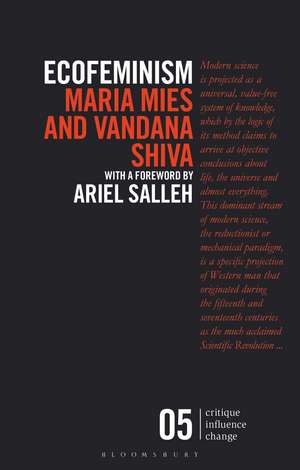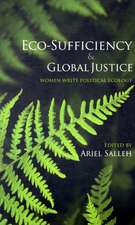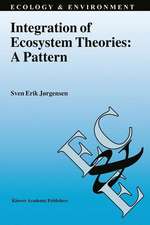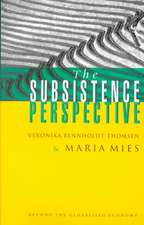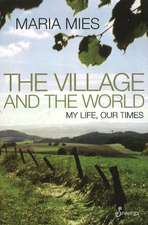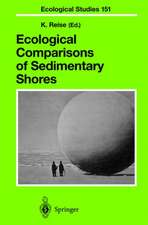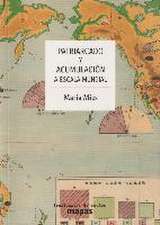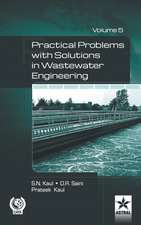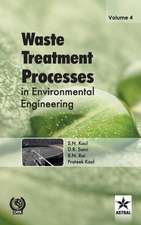Ecofeminism: Critique Influence Change
Autor Vandana Shiva, Maria Mies Cuvânt înainte de Ariel Sallehen Limba Engleză Paperback – 14 dec 2022
Preț: 103.53 lei
Nou
Puncte Express: 155
Preț estimativ în valută:
19.81€ • 20.79$ • 16.44£
19.81€ • 20.79$ • 16.44£
Carte tipărită la comandă
Livrare economică 11-25 aprilie
Preluare comenzi: 021 569.72.76
Specificații
ISBN-13: 9781350379886
ISBN-10: 1350379883
Pagini: 360
Dimensiuni: 138 x 216 x 21 mm
Greutate: 0.46 kg
Editura: Bloomsbury Publishing
Colecția Bloomsbury Academic
Seria Critique Influence Change
Locul publicării:London, United Kingdom
ISBN-10: 1350379883
Pagini: 360
Dimensiuni: 138 x 216 x 21 mm
Greutate: 0.46 kg
Editura: Bloomsbury Publishing
Colecția Bloomsbury Academic
Seria Critique Influence Change
Locul publicării:London, United Kingdom
Caracteristici
A ground-breaking eco-feminist account of the impact of ecological destruction and industrial catastrophe on the everyday life of women
Notă biografică
Maria Mies is a Marxist feminist scholar and activist, renowned for her theory of capitalist-patriarchy, which recognizes third world women and difference. In 1979, at the Institute of Social Studies in The Hague, she founded the Women and Development programme. She has written numerous books and articles that deal with topics relating to feminism, third world issues and the environment, including The Lace Makers of Narsapur (1982), Women: The Last Colony (1988), Patriarchy and Accumulation on a World Scale (1999) and The Subsistence Perspective (1999).Vandana Shiva, a world-renowned environmental leader and thinker, is director of the Research Foundation on Science, Technology, and Ecology, India. In 1993 Shiva won the Alternative Nobel Peace Prize and in 2010 was awarded the Sydney Peace Prize for her commitment to social justice. She is the author of over 20 books, including Staying Alive (1989), The Violence of the Green Revolution (1991), Biodiversity (1992), Monocultures of the Mind (1993), Biopolitics (1995), Stolen Harvest (2001), Protect or Plunder (2001), Earth Democracy (2005) and Soil Not Oil (2009).
Cuprins
Foreword - Ariel Salleh Preface to the 'Critique Influence Change' edition 1. Introduction: Why We Wrote This Book Together Part I: Critique and Perspective 2. Reductionism and Regeneration: A Crisis in Science, Vandana Shiva 3. Feminist Research: Science, Violence and Responsibility, Maria Mies Part II: Subsistence V. Development 4. The Myth of Catching-up Development, Maria Mies 5. The Impoverishment of the environment: Women and Children Last, Vandana Shiva 6. Who Made Nature Our Enemy?, Maria Mies Part III: The Search for Roots 7. Homeless in the 'Global Village', Vandana Shiva 8. Masculinization of the Motherland, Vandana Shiva 9. Women Have No Fatherland, Maria Mies 10. White Man's Dilemma: His Search for What He has Destroyed, Maria Mies Part IV: Ecofeminism V. New Areas of Investment through Biotechnology 11. Women's Indigenous Knowledge and Biodiversity Conservation, Vandana Shiva 12. New Reproductive Technologies: Sexist and Racist Implications, Maria Mies 13. From the Individual to the Dividual: the Supermarket of 'Reproductive alternatives' Maria Mies Part V: Freedom for Trade or Freedom for Survival 14. Self Determination: The End of a Utopia? Maria Mies 15. GATT, Agriculture and Third World Women, Vandana Shiva 16. The Chipko Women's Concept of Freedom, Vandana, Shiva
Recenzii
This book is a light in the dark age of social and ecological crises. Not only does it interconnect the destructive tendencies of the capitalist patriarchal global politics of homogenization, fragmentation and colonization, but it also offers the subsistence perspective as a form of resistance and liberation within the limits of nature.
[Ecofeminism] presents a very focused, searing indictment of development strategies practiced by the North on the South.
Ecofeminism is about the similarity of society´s relationship with nature and women. Mies and Shiva were the first to show the sad parallels in nearly all spheres of life, in the North as well as in the South. Their book belongs to the classical texts of a feminism that developed a more profound critique of modernity as "capitalist patriarchy" than Marxism, ecoscience and gender studies had done. Twenty years later the global spread of neoliberalism has resulted in the "death of nature", even of Planet Earth, and the death of women in many ways, leading to the emergence of new social movements worldwide.
In view of the post-modern fashion for dismantling all generalizations, the views propounded in Mies' and Shiva's Ecofeminism make refreshing reading. They show a commendable readiness to confront hypocrisy, challenge the intellectual heritage of the European Enlightenment, and breathe spiritual concerns into debates on gender and the environment. Technology development could benefit from their plea that progress through the control of nature must be replaced by cooperation, mutual care, and love.
This book is prescient: its time is now. It helps us to understand why women are taking the lead in the struggle to resist global forces endangering our survival and to forge a new society. The courage, radicalism and lucidity of Mies and Shiva twenty years ago still guide us on the path ahead.
Vandana Shiva and Maria Mies offer an all-embracing vision. They show the interconnectedness of these problems and trace them to their source: how our modern world has been relating to Nature since the time of the Enlightenment right up to the biotechnology of today; how superiority to and dominance over Nature has ensured the violence inseparable from our civilisation. [...] For all those, and certainly for humanists, who are wrestling with the ethical, sexist and racist issues raised by invasive reproductive gene technology, Maria Mies' chapters on these developments are a must: she subjects them to the most thorough and thoughtful investigation based on what I see as sound humanist as well as feminist philosophy.
The re-release of Ecofeminism after twenty years is auspicious and long overdue. Converging from widely divergent perspectives, Mies and Shiva achieved a profound conceptual synthesis: the rising of women, everywhere, to protect life from the capitalist patriarchal World System. Overturning all, like good cultivators, they prepare the earth for renewal.
Maria Mies and Vandana Shiva, a German social scientist from the feminist movement and an Indian physicist from the ecology movement, are ideally suited to author a book of such broad intellectual, geographic, and political scope. while there are some notable differences in their approaches, they are crystal clear their adversaries as patriarchal capitalism, which they hold responsible for the colonization of developing countries, women, and nature.
This book provides an extraordinarily productive framework for entire generations of scholars and activists
Dual authorship at its best, these complementary perspectives of an Indian physical scientist and a German social scientist combine to bring feminist scruples to bear on the environment, new reproductive technologies and masculinist thinking.
Read independently of the collection, many of the essays have innovative things to say to the political movements involved in fighting large scale development, nuclear energy, violence against women, wars and environmental destruction. Shiva's discussion of the development establishment's misnomer of poverty, her discussion of the biotechnology and the impact of GATT on third world women and informative political critique, and Mies on eco-tourism, German women's response to Chernobyl, and her critique of body as property and self-determination in the context of surrogacy, are enlivening additions to important debates.
[Ecofeminism] presents a very focused, searing indictment of development strategies practiced by the North on the South.
Ecofeminism is about the similarity of society´s relationship with nature and women. Mies and Shiva were the first to show the sad parallels in nearly all spheres of life, in the North as well as in the South. Their book belongs to the classical texts of a feminism that developed a more profound critique of modernity as "capitalist patriarchy" than Marxism, ecoscience and gender studies had done. Twenty years later the global spread of neoliberalism has resulted in the "death of nature", even of Planet Earth, and the death of women in many ways, leading to the emergence of new social movements worldwide.
In view of the post-modern fashion for dismantling all generalizations, the views propounded in Mies' and Shiva's Ecofeminism make refreshing reading. They show a commendable readiness to confront hypocrisy, challenge the intellectual heritage of the European Enlightenment, and breathe spiritual concerns into debates on gender and the environment. Technology development could benefit from their plea that progress through the control of nature must be replaced by cooperation, mutual care, and love.
This book is prescient: its time is now. It helps us to understand why women are taking the lead in the struggle to resist global forces endangering our survival and to forge a new society. The courage, radicalism and lucidity of Mies and Shiva twenty years ago still guide us on the path ahead.
Vandana Shiva and Maria Mies offer an all-embracing vision. They show the interconnectedness of these problems and trace them to their source: how our modern world has been relating to Nature since the time of the Enlightenment right up to the biotechnology of today; how superiority to and dominance over Nature has ensured the violence inseparable from our civilisation. [...] For all those, and certainly for humanists, who are wrestling with the ethical, sexist and racist issues raised by invasive reproductive gene technology, Maria Mies' chapters on these developments are a must: she subjects them to the most thorough and thoughtful investigation based on what I see as sound humanist as well as feminist philosophy.
The re-release of Ecofeminism after twenty years is auspicious and long overdue. Converging from widely divergent perspectives, Mies and Shiva achieved a profound conceptual synthesis: the rising of women, everywhere, to protect life from the capitalist patriarchal World System. Overturning all, like good cultivators, they prepare the earth for renewal.
Maria Mies and Vandana Shiva, a German social scientist from the feminist movement and an Indian physicist from the ecology movement, are ideally suited to author a book of such broad intellectual, geographic, and political scope. while there are some notable differences in their approaches, they are crystal clear their adversaries as patriarchal capitalism, which they hold responsible for the colonization of developing countries, women, and nature.
This book provides an extraordinarily productive framework for entire generations of scholars and activists
Dual authorship at its best, these complementary perspectives of an Indian physical scientist and a German social scientist combine to bring feminist scruples to bear on the environment, new reproductive technologies and masculinist thinking.
Read independently of the collection, many of the essays have innovative things to say to the political movements involved in fighting large scale development, nuclear energy, violence against women, wars and environmental destruction. Shiva's discussion of the development establishment's misnomer of poverty, her discussion of the biotechnology and the impact of GATT on third world women and informative political critique, and Mies on eco-tourism, German women's response to Chernobyl, and her critique of body as property and self-determination in the context of surrogacy, are enlivening additions to important debates.
